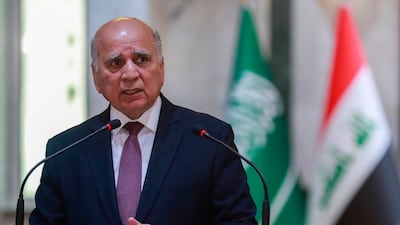Iraqi Foreign Minister Fuad Hussein will lead a delegation to Washington next week to discuss the falling value of the dinar against the dollar and other issues facing the country.
The visit, announced by the Foreign Ministry on Friday, comes as Iraq's government faces mounting public anger over the rising cost of goods because of the drop in the dinar's value.
Protests have been held in Baghdad and southern cities to demand government action to stabilise the currency.
The official exchange rate fixed by the government is 1,470 dinars for one dollar, but the US currency is being sold for as much as 1,700 at street exchanges.
The economy and finance will be top of the agenda during Mr Hussein's visit to Washington on Wednesday and Thursday, Foreign Ministry spokesman Ahmed Al Sahaf told reporters.
“The high exchange rate of the dollar in Iraq and the possibility of co-operation and co-ordination with the American side in this matter will be discussed,” he said.
Mr Al Sahaf said the Iraqi delegation would include members of the financial and banking sectors, and would discuss “a number of issues of common interest based on the strategic framework agreement” with the US.
The visit was announced a day after US President Joe Biden held a phone call with Iraqi Prime Minister Mohammed Shia Al Sudani and reaffirmed Washington's commitment to Baghdad, according to a White House statement.
“The leaders discussed the Prime Minister’s economic agenda and plans to ensure that Iraq’s economy is delivering for the Iraqi people, policies the US is prepared to fully endorse,” the White House said.
It said Mr Biden welcomed the visit by Mr Hussein next week to further discuss these programmes.
Since the 2003 US-led invasion of Iraq, the country's foreign currency reserves have been housed at the US Federal Reserve, giving the Americans significant control over Iraq’s supply of dollars.
The Central Bank of Iraq requests dollars from the Fed and then sells them to commercial banks and exchange houses at the official exchange rate through a mechanism known as the “dollar auction”.
However, the amount of dollars released by the Fed has dropped sharply following increased US scrutiny of the final recipients of the funds, leading to the currency being quoted at higher rates by Iraqi traders.
Iraq also faces a problem of endemic corruption that has affected development, job creation and public services.
Jeanine Hennis-Plasschaert, the UN special representative for Iraq, told the Security Council on Thursday that while the Iraqi government had made progress on tackling corruption, “systemic change” was needed to solve the problem.
Iraq is ranked 157 out of 180 countries listed in Transparency International's Corruption Perceptions Index.




![A man holds a sign reading in Arabic: 'Depreciate the rate of the [US] dollar, or else!' AFP](https://www.thenationalnews.com/resizer/v2/RP6EKISD46G7UU2THVKMGONYZI.jpg?smart=true&auth=7303407b105f32a1a72777f9693808f49d393c514ba1e8be30af5d1a7a117a77&width=400&height=225)






